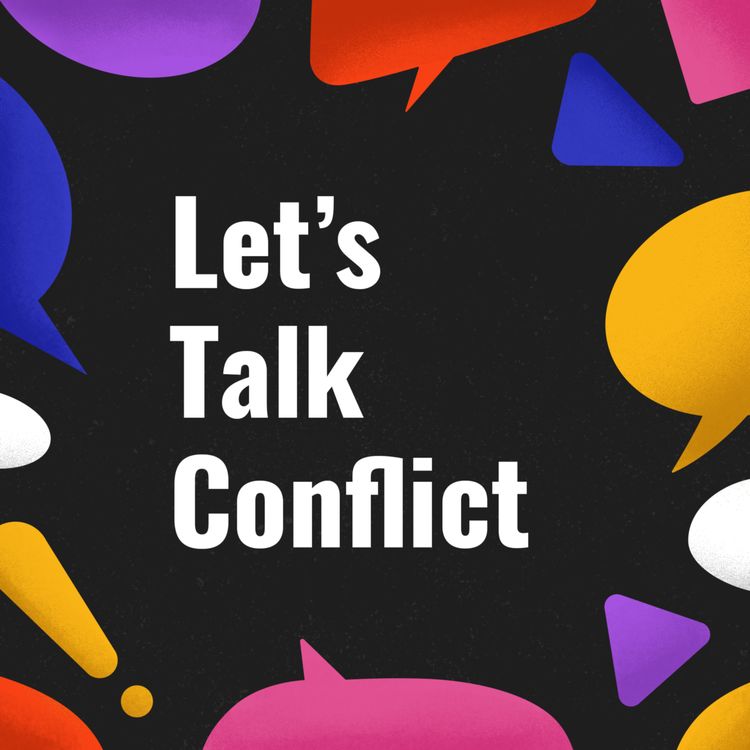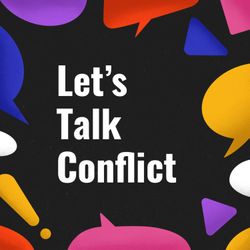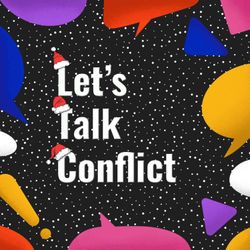Share

Let's Talk Conflict
Trailer: Season 2
Season 2, Ep. 0
•
Season 2 is here! This time, it's all about personal development. This trailer will give you a taste of what to expect from our group of Care Experts over the next six episodes...
More episodes
View all episodes

6. 6. The Real Experts: Redesigning the Care System
50:21||Season 2, Ep. 6In this episode, the group explore how they would redesign the care system. They speak about some of the best practice happening in the care system, and reflect on the core values and principles that a new system should be built on. Reflecting on their experiences, the group identify the biggest issues that are failing young people in the care system, and what needs to be in place to support young people to thrive.
5. 5. Busting Myths about Charities
40:39||Season 2, Ep. 5In this episode, the group take a deep dive into their experiences with charities, and how different organisations have helped and influenced theirs lives, all the way from personal to professional development.They reflect on some of the common misconceptions and stigma around being involved with charities. Find out about the group’s favourite charities and organisations, and ways in which they might be able to support and empower you too.Charities signposted in the episode:https://www.childrenssociety.org.uk/https://becomecharity.org.uk/https://www.nyas.net/https://www.barnardos.org.uk/https://coramvoice.org.uk/https://www.reesfoundation.org/
4. 4. Understanding Trauma and the Journey of Healing
01:07:48||Season 2, Ep. 4In this episode the group are joined by two guests who are both care experienced, and who now work with young people in the care system: Jamie - a psychotherapist, and Mary - a care-experienced trainer, adviser and advocate.The group explore how different behaviours manifest when a young person has experienced trauma, rejection and abandonment. They also discuss the importance of relationships when healing from trauma, as well as some tools to support yourself and those around you.See below for the organisations, support networks and resources signposted during the episode:https://www.reesfoundation.org/ask-jan-membership.htmlhttps://www.nice.org.uk/about/what-we-do/our-programmes/nice-advice/iapthttps://freepsychotherapynetwork.com/https://hubofhope.co.uk/https://www.england.nhs.uk/mental-health/adults/iapt/https://www.jamiecrabbtherapy.com/post/exploring-feeling-emotions-resources https://insighttimer.com/vimalasara/guided-meditations/five-basic-needs-of-the-heart-for-emotional-trauma-and-self-soothing
3. 3. Mental Health Services Explored: The Facts
45:49||Season 2, Ep. 3In this episode, the group explore access to mental health services and some of the barriers for care experienced young people. They are joined by a special guest - Alice Philips is a PhD researcher specialising in care experienced young people's access to mental health support. The group discuss what support is already out there; what the flaws are in the current systems; and some of the potential solutions that could lead the way to better mental health support for care experienced young people. You can find support with the following organisations and helplines which are mentioned during the episode:https://www.nhs.uk/service-search/mental-health/find-a-psychological-therapies-service/https://www.nyas.net/https://becomecharity.org.uk/get-information/mental-health-and-wellbeing/https://www.mind.org.uk/information-support/helplines/
2. 2. Red Flags and Relationships
23:05||Season 2, Ep. 2In this episode the group discuss the good, the bad and the ugly of relationships. They explore red flags, boundary setting, self-worth, and understanding what you want, need and deserve from relationships. They also share some of the positive tools and skills they have learnt from their own experiences, so you can feel more equipped to build and keep healthy relationships. If you have been affected by any of the issues discussed in this episode, you can find support from the following organisations:https://www.paladinservice.co.uk/https://www.womensaid.org.uk/ https://www.gov.uk/guidance/domestic-abuse-how-to-get-helpYou can also refer to the power and control wheel, created by Ellen Pence, Michael Paymar and Coral McDonald. Although this isn't an exhaustive list of types of abuse, we hope that this model can help to inform you about what forms abuse can take, and possibly help you to identify if you are in an abusive relationship. We encourage you to reach out to one of the organisations above if you need support.
1. 1. Making Success Work for You
39:25||Season 2, Ep. 1As care experienced people, we often find that we aren't encouraged to have aspirations and to dream big about where we want to be in the future. In this episode, We explore our individual meanings of success, how we measure it and how to make success work for you. We explain why our care experience does not limit our aspirations or influence how we define success.
Christmas Special
42:57|In this Christmas Special, the group reflect on their own experiences of Christmas while growing up. They discuss some of the challenging aspects of Christmas, and share their thoughts on how to make Christmas as fun and positive as possible. Stay tuned until the end to join the group for a Christmas Quiz!Visit https://christmasdayrichmond.com/ to be involved in a Christmas Day Dinner, and other opportunities for care experienced young people over the Christmas period.If you are struggling this Christmas, you can visit Samaritans for support: https://www.samaritans.org/Thank you for listening and we wish you a happy and healthy Christmas and New Year!
7. Co-producing a Podcast: Our Journey
43:43||Season 1, Ep. 7In this episode, the group reflect on the process of co-producing a podcast. They share some of the challenges of co-production, what has worked well and what we have learned over the past year.